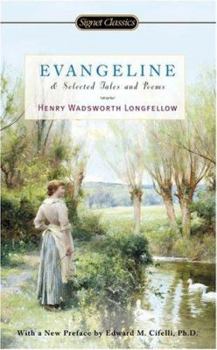Evangeline and Selected Tales and Poems
Select Format
Select Condition 
Book Overview
No Marketing Blurb
Format:Mass Market Paperback
Language:English
ISBN:0451529650
ISBN13:9780451529657
Release Date:January 2005
Publisher:Signet Classics
Length:264 Pages
Weight:0.40 lbs.
Dimensions:0.8" x 4.3" x 6.8"
Age Range:18 years and up
Grade Range:Postsecondary and higher
Customer Reviews
2 ratings
Virtues and Faults of an American Poet
Published by Thriftbooks.com User , 16 years ago
Henry Wadsworth Longfellow was not a great poet, and his poetry is not particularly profound. But he was a good poet. His verse displays intelligence and sometimes emotional power. Here is a fairly representative collection of thirty-seven poems by Longfellow that allow us to observe him at his best and at his worst, but with the good pieces far outweighing the bad. Two faults of Longfellow that have been frequently cited by modern readers are a tendency to be overly sentimental and a tendency to moralize. You can see both of these traits in the last four verses of "The Village Blacksmith". Similarly, "Seaweed" (not in this collection) begins with some absolutely beautiful descriptive imagery and then tapers off with three rather tedious didactic verses. But some qualifications should be made. "Psalm of Life" is purely didactic-- a sermon from begining to end. But a lively verse form and a series of snappy lines and images save the day. "The Wreck of the Hesperus" contains a moral in the last two lines of the poem: "Christ save us from a death like this/ On the reefs of Norman's Woe". But it is done so smoothly that it seems a natural part of the ballad. Not all moralizing by Longfellow is trite, superficial, or platitudinous. Similarly, some efforts to appeal to emotion succeed. There is the crisp excitement of "Paul Revere's Ride," and the quiet nostalgia of "My Lost Youth." There is the dignified grief for the death of a fellow writer in "Hawthorne," and the powerful feelings of grief for the death of his wife in "The Cross of Snow". I personally find "The Children's Hour" to be nausiously cute, but I suppose that there are many who will love its humor. I did like the relaxed feel of "The Day is Done," though I confess that its last verse reminded me of a parody-- Longfellow is easy to parody-- that I learned as a child: An Arab stood on a vending machine, In the light of the lingering day. A counterfeit penny he put in the slot, And silently stole a weigh. Longfellow's long poems are fairly well represented in this collection. It contains the complete texts of "Evangeline" and "The Courtship of Miles Standish". In addition, there are six selections from "The Song of Hiawatha" and two selections from "The Saga of King Olaf". I would have liked to have seen a few more selections from "King Olaf," which I believe is one of Lonfellow's very best poems-- and also one of his strangest. But on the balance, this is not a bad selection for modern readers. Part of the appeal of this book lies in the extra features that it offers. There is a short story by Longfellow that reminds me a bit of the Alfred Hitchcock movie, _The Trouble with Harry_. See what you think. In addition, there are three critical essays (by Horace Gregory, Van Wyck Brooks, and Norman Holmes Pearson) and a parody of "Hiawatha" by Lewis Carroll. Altogether, an excellent introductory collection to a solid American poet. You are likely to reread these pieces as if you
A great anthology of a true poet's work.
Published by Thriftbooks.com User , 24 years ago
Henry Wadsworth Longfellow is perhaps the greatest rhymester to have ever lived. His endless rhymes almost seem to stay in one's mind, refusing to go. And this edition of his collected poetry just shows Longfellow at his best. This here is poetry that - though over a hundred years old - is still fresh and alive with vigor. The poems tell tales of men and women, of birds and beast, and of gods and demigods (such as found in The Song of Hiawatha) in such magnificent form that it isn't a wonder why Longfellow was known to be the greatest American poet of his time."A poem should not mean but be," Archibald MacLeish wrote in "Ars Poetica." These poems are not intricate, and they're not incomprehensible, and they're definitely not senseless nor pointless; they are timeless, rhetoric voices of literature that tell so much . . . of so much. And besides, how much times do we come across a poet who does not want to talk about how he feels and his emotions? It seems to be all that poets want to write about. It's good to sometimes read poems that simply want to tell stories and not what the Soul, or the Heart, or the Mind feels. Those things can be nice, but can make one ponder more than he or she should. Another thing that will become apparent to the reader of this book is that Longfellow was a keen observer of people. In these poems, he writes about them very well. "The Village Blacksmith," for example, is a brilliant poem that tells of one ordinary man with an ordinary occupation: being a blacksmith. It's not of some Don Juan, or Rob Roy, or Casanova that in real life are as scarce as an honest politician. The story of the man in the poem - how he toils, and mourns, and triumphs, and suffers - is one that anyone can relate to. It is even possible to find comfort in these poems that simply tell stories and not of emotional issues. Also, as I aforementioned, the iambic tales will stay in your mind as you might find it hard to forget them. It is probably the simplicity of these poems that make them so easy to memorize, and are probably what made Longfellow great.





